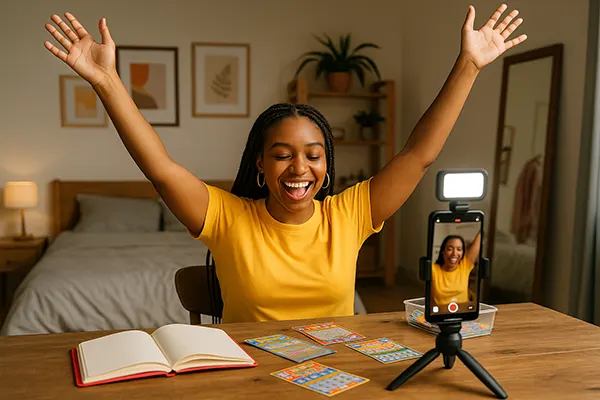In 2025, TikTok has become more than just a video-sharing service. It has transformed into a space where content creators blend entertainment, monetisation, and interactivity. One of the most notable trends is the emergence of “lottery shows” — live-streamed events that resemble lottery draws, where influencers invite viewers to participate, interact, and potentially win prizes. But how does this format work in practice, and what are the legal and financial implications for those involved?
The Mechanics Behind TikTok “Lottery Shows”
Lottery-themed streams have gained popularity due to their simplicity and audience engagement. Typically, influencers organise giveaways or “draws” during a live broadcast. They assign numbers to participants who meet specific criteria: following the account, sharing the stream, or sending virtual gifts — TikTok’s monetisable tokens.
These shows usually involve spinning wheels, random number generators, or bingo-style machines. The anticipation is built up live as viewers comment, cheer, and hope their number gets picked. Influencers use visually appealing props and dynamic speech to maintain attention and encourage more interaction.
For many viewers, the experience is as thrilling as traditional lottery broadcasts on TV. However, instead of official regulatory backing, everything is operated by individual creators under TikTok’s moderation policies, which vary by region and often lag behind the fast pace of content innovation.
Revenue Streams and Monetisation Tools
The financial model is centred around TikTok’s in-app currency. When viewers send gifts during streams, creators receive a portion of the value in real currency. Some streams also include paid promotions, product placements, or direct tipping via external links. The more engaging the lottery show, the higher the chance of generating income.
In 2025, TikTok introduced new creator monetisation tools, including reward-based challenges and streaming bonuses. Influencers capitalise on these by integrating lottery themes into their campaigns. This has led to a rise in cross-promotion: creators now collaborate with gaming brands, fashion retailers, and even crypto projects.
However, it’s crucial to note that not all income is passive. Successful lottery show hosts invest heavily in preparation, streaming gear, and audience-building tactics. They also monitor legal risks and continually adapt to new TikTok policies to avoid suspension or shadow bans.
Legal Considerations and Grey Zones
While TikTok’s terms prohibit gambling, the definition of what constitutes a lottery or game of chance varies across jurisdictions. Many “lottery shows” operate in a legal grey area. If no monetary purchase is required to enter — for instance, if entry is based solely on interaction — the stream may avoid classification as gambling.
Still, authorities in countries like Germany, Canada, and South Korea have begun scrutinising such content. In 2025, France fined several TikTok users for allegedly running illegal raffles. Meanwhile, the UK Gambling Commission issued updated guidance for creators whose content resembles chance-based games with prize incentives.
To navigate this, experienced influencers include disclaimers and transparency rules. Some also collaborate with legal consultants or agencies specialising in compliance for digital creators. TikTok itself has introduced tools for flagging and moderating risky live activities, but enforcement remains inconsistent globally.
Ethical Implications for Creators
Even if technically legal, the ethics of lottery shows on TikTok continue to be debated. Critics argue that they exploit psychological triggers and often target younger audiences. The visual excitement, suspense, and potential reward closely mimic gambling behaviour, raising concerns about long-term effects.
Some creators counter this by framing their shows as “interactive games” with educational value or entertainment purposes. Others limit participation to users over 18, or implement cooldown periods to avoid excessive engagement. Nonetheless, the line between gamification and gambling remains blurred.
In response, platforms like YouTube and Instagram have started tightening their streaming rules. TikTok, while still permissive in many regions, is under pressure to implement clearer age filters and notification mechanisms to protect vulnerable users.

Impact on Audience Behaviour and Digital Culture
The popularity of lottery streams reflects broader changes in online entertainment. Users increasingly favour interactive content that offers more than passive viewing. They seek participation, unpredictability, and real-time feedback — all of which lottery shows provide in abundance.
This trend aligns with the rise of “micro-monetisation”: instead of relying on large sponsors, influencers earn through numerous small transactions. From a sociological perspective, the lottery show phenomenon highlights a shift in how digital communities form, trust creators, and engage in playful risk-taking.
Audience behaviour data from 2025 indicates that streams involving participation incentives generate 35% higher engagement than passive content. Influencers who master this formula can build highly loyal fanbases, turning entertainment into a semi-professional income source.
What Comes Next in 2025 and Beyond
As platforms evolve, so will the format of lottery shows. New features like augmented reality overlays, synchronised group challenges, and regional streaming regulations are expected to shape the next generation of interactive broadcasts. Companies are already experimenting with AI-driven randomisers and decentralised giveaway tools using blockchain.
In this competitive ecosystem, creators who understand both the technical tools and the regulatory environment will stand out. Transparency, creativity, and community engagement will likely define success. The challenge will be to maintain viewer trust while exploring new monetisation paths.
Ultimately, whether lottery shows remain a dominant trend depends on their ability to balance excitement with responsibility. If done right, they may become a staple of digital entertainment — a modern blend of performance, interactivity, and game mechanics for the streaming age.